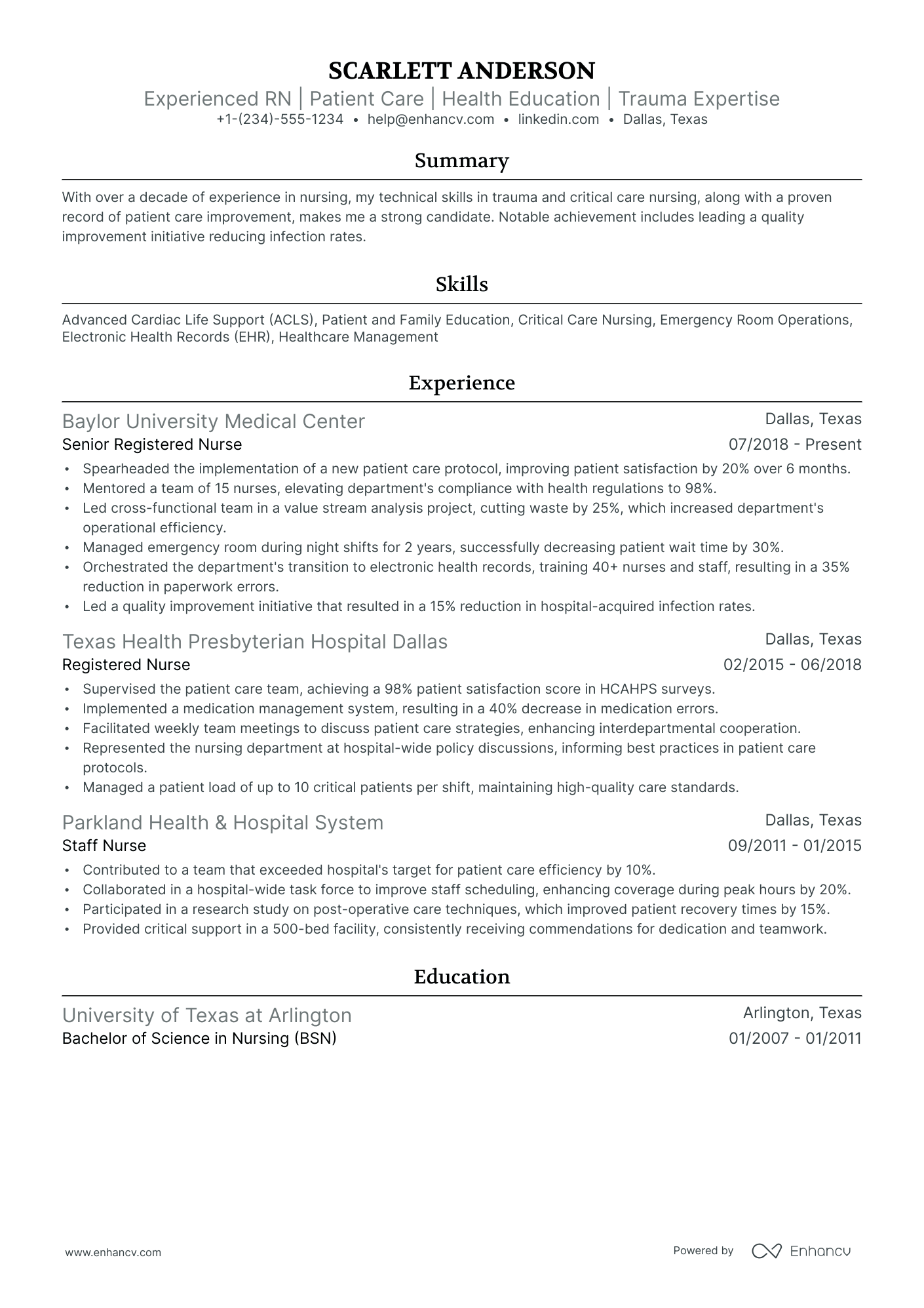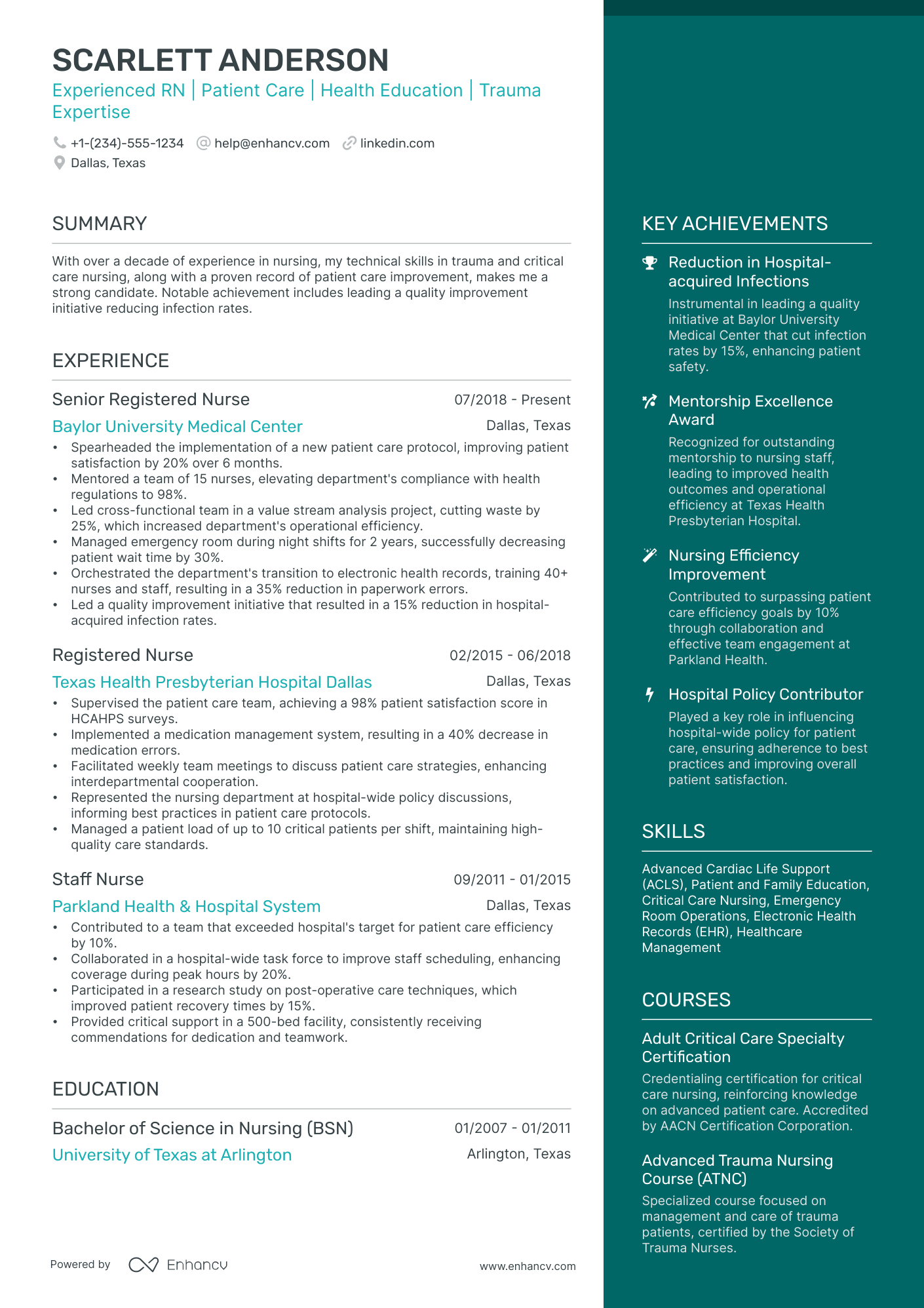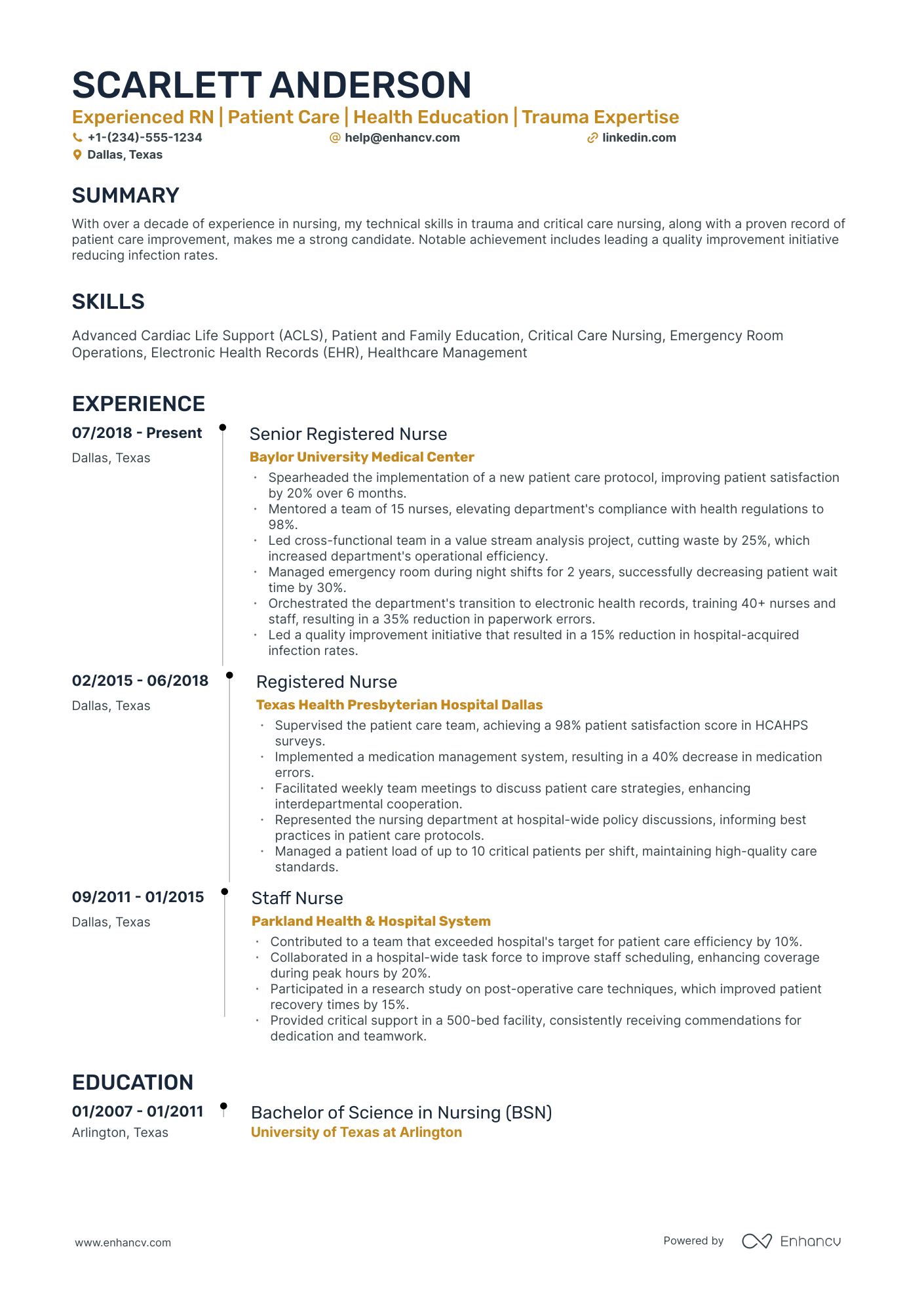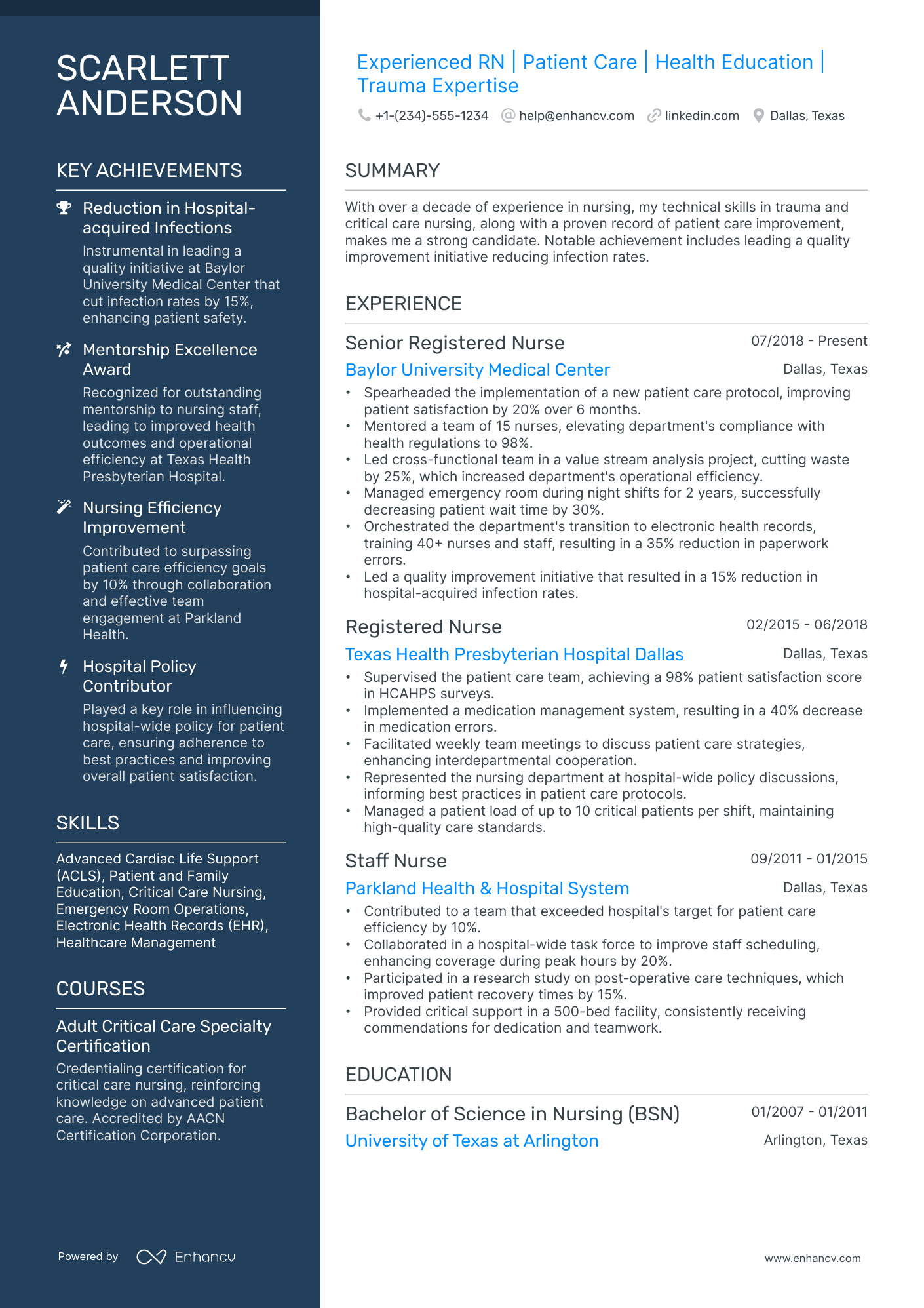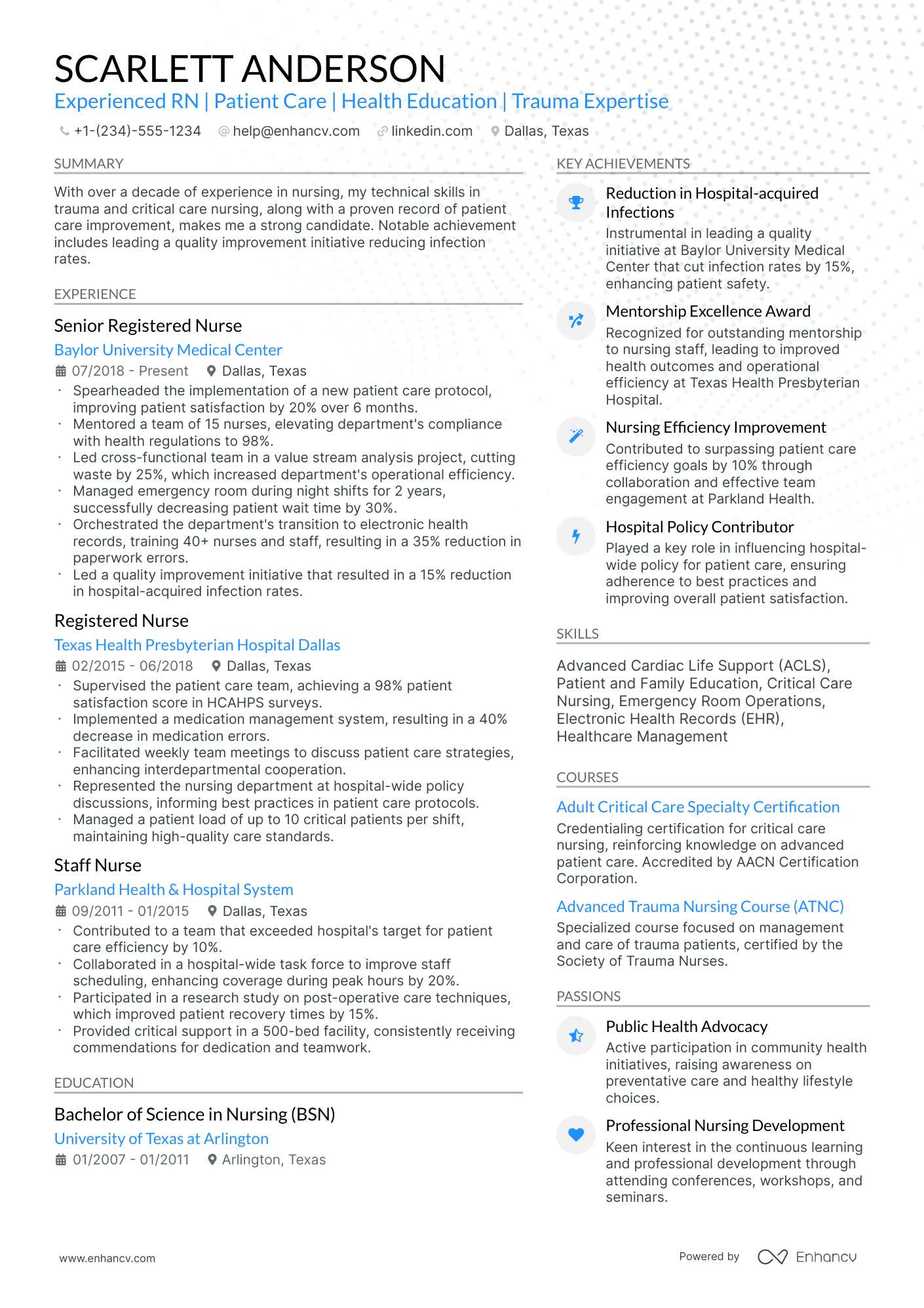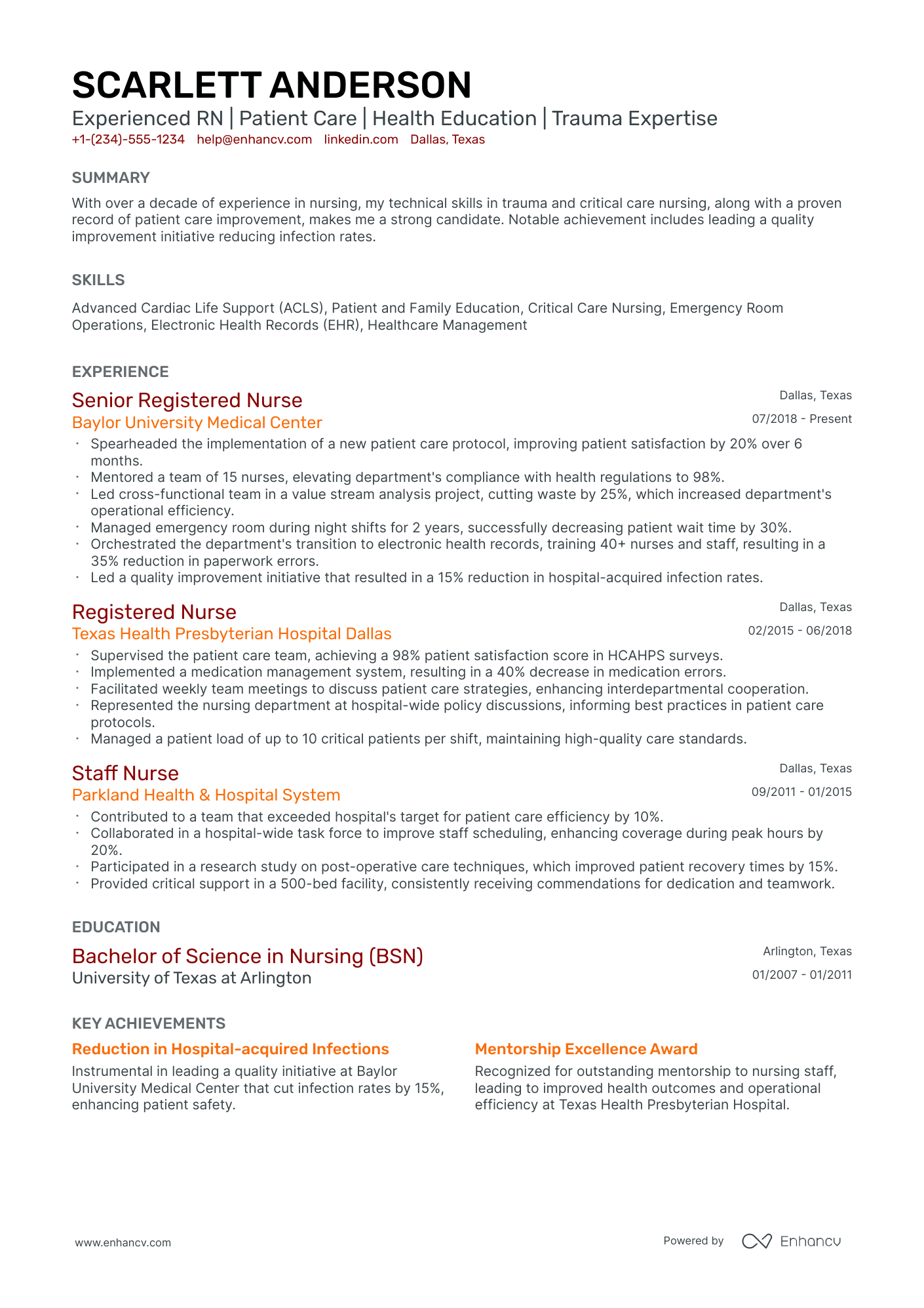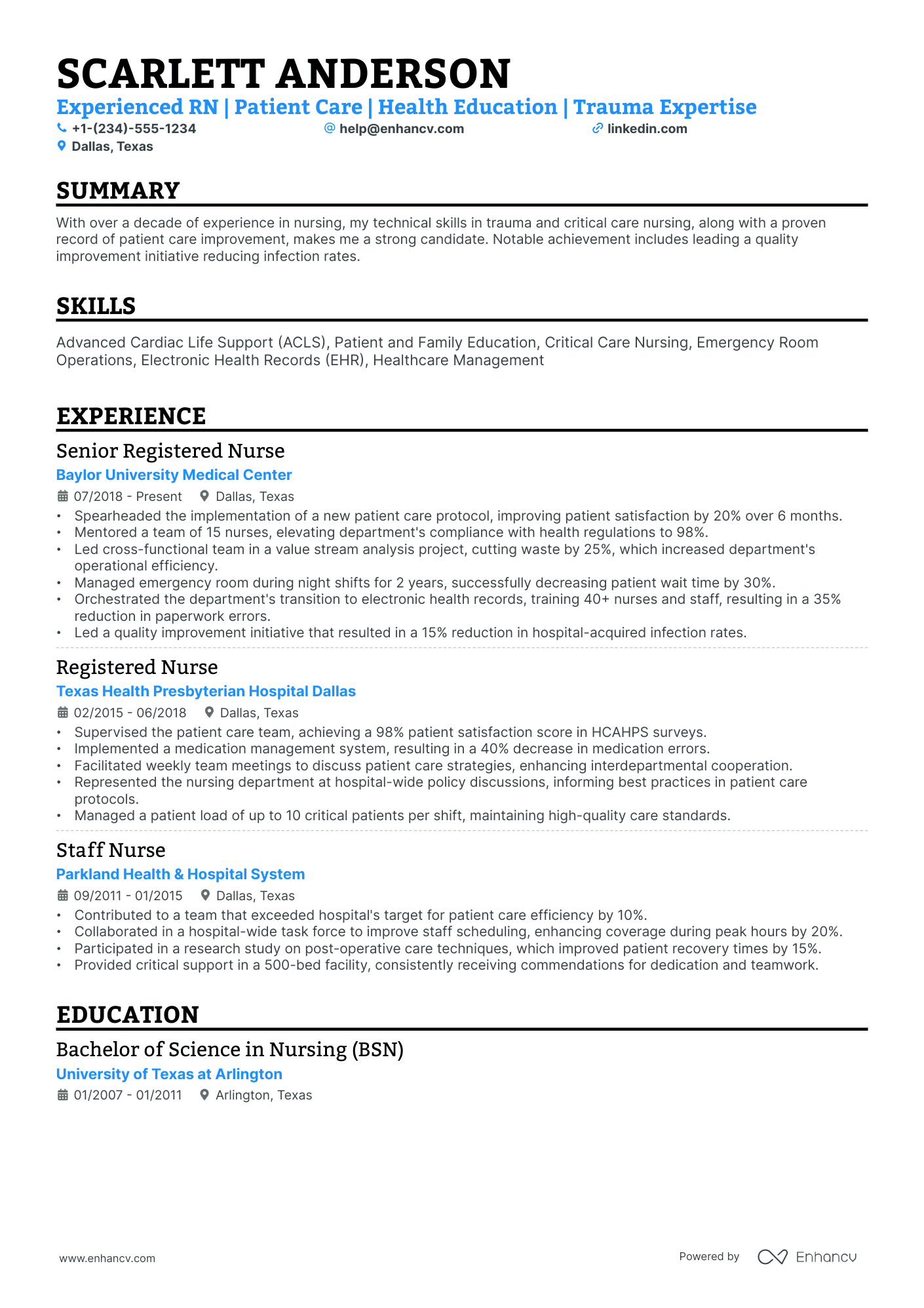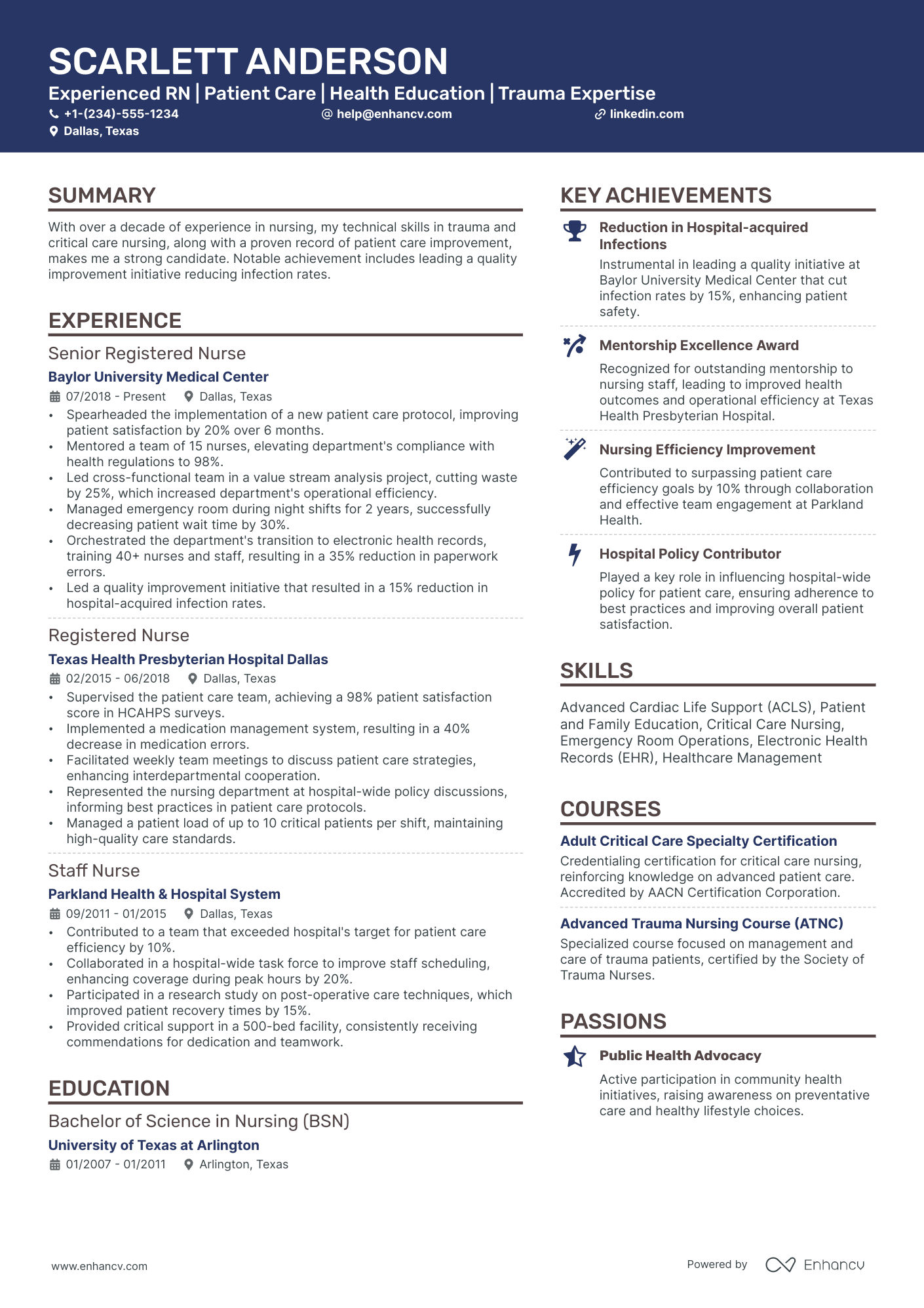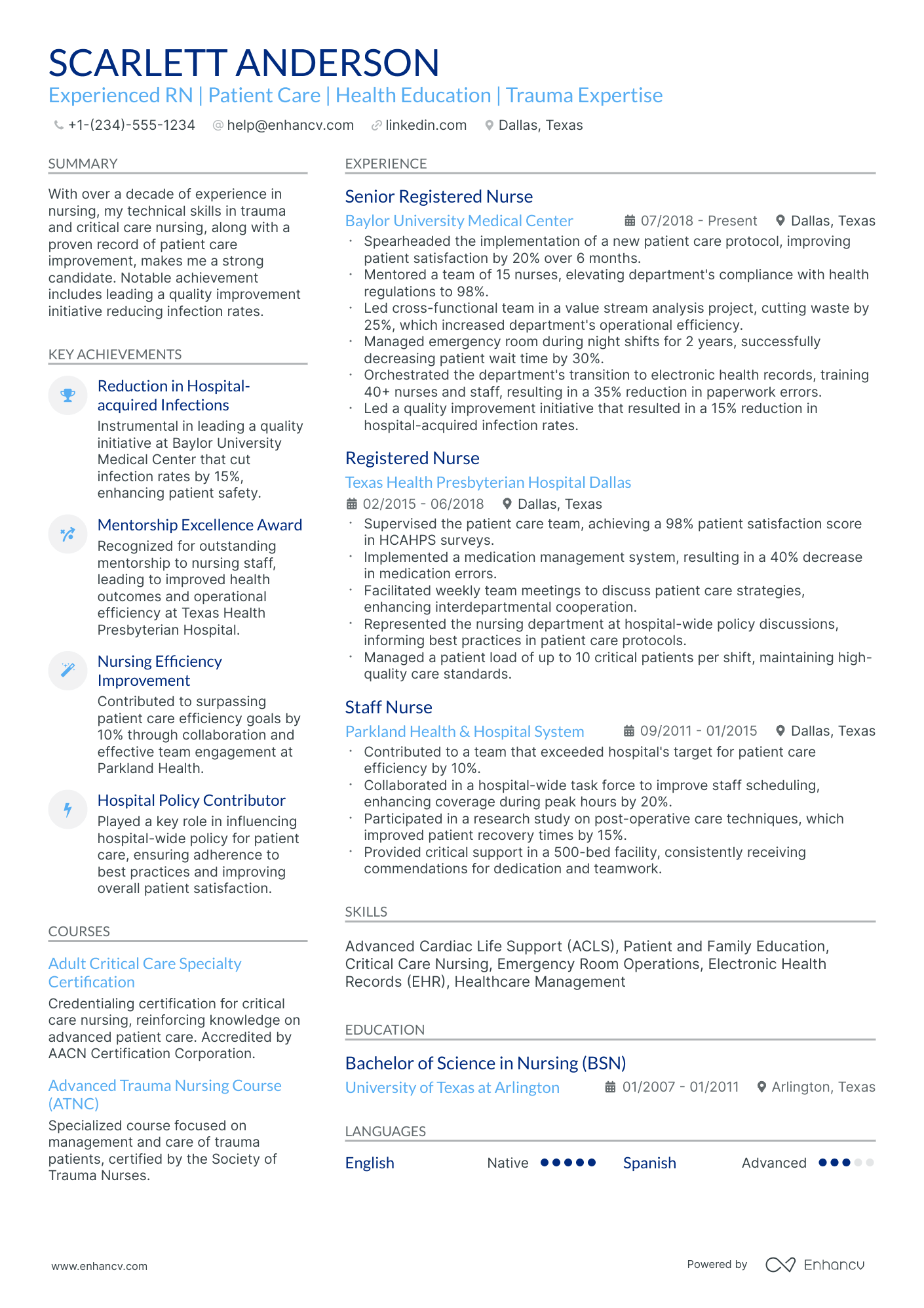As a staff nurse, you may struggle to effectively capture the full scope of your clinical experience and specialized skills on a resume. Our guide is designed to help you articulate your professional nursing competencies with clarity, ensuring your resume stands out to potential employers.
- The most effective staff nurse resume samples, reflecting on experience and skills.
- +10 simple, yet impactful methods to tailor your staff nurse resume to the job advert.
- Using your professional achievements as the North Star to your unique value as a staff nurse candidate.
- 'No one cares about your education nowadays …' Let's prove this statement wrong with the best-kept industry secrets to your education and certifications.
If the staff nurse resume isn't the right one for you, take a look at other related guides we have:
- Pediatric Dentist Resume Example
- Public Health Resume Example
- Respiratory Therapist Resume Example
- Clinical Nurse Manager Resume Example
- Au Pair Resume Example
- Perioperative Nurse Resume Example
- Medical Receptionist Resume Example
- Staff Pharmacist Resume Example
- Patient Service Representative Resume Example
- Pharmacy Manager Resume Example
Professional staff nurse resume format advice
Achieving the most suitable resume format can at times seem like a daunting task at hand.
Which elements are most important to recruiters?
In which format should you submit your resume?
How should you list your experience?
Unless specified otherwise, here's how to achieve a professional look and feel for your resume.
- Present your experience following the reverse-chronological resume format . It showcases your most recent jobs first and can help recruiters attain a quick glance at how your career has progressed.
- The header is the must-have element for your resume. Apart from your contact details, you could also include your portfolio and a headline, that reflects on your current role or a distinguishable achievement.
- Select relevant information to the role, that should encompass no more than two pages of your resume.
- Download your resume in PDF to ensure that its formatting stays intact.
Keep in mind market-specific formats – for example, a Canadian resume might follow a different structure.
Upload & Check Your Resume
Drop your resume here or choose a file. PDF & DOCX only. Max 2MB file size.
PRO TIP
Always remember that your staff nurse certifications can be quantified across different resume sections, like your experience, summary, or objective. For example, you could include concise details within the expertise bullets of how the specific certificate has improved your on-the-job performance.
Fundamental sections for your staff nurse resume:
- The header with your name (if your degree or certification is impressive, you can add the title as a follow up to your name), contact details, portfolio link, and headline
- The summary or objective aligning your career and resume achievements with the role
- The experience section to curate neatly organized bullets with your tangible at-work-success
- Skills listed through various sections of your resume and within an exclusive sidebar
- The education and certifications for more credibility and industry-wide expertise
What recruiters want to see on your resume:
- Clinical skills and areas of expertise (e.g., expertise in pediatric, geriatric, emergency care, ICU)
- Relevant certifications (e.g., BLS, ACLS, PALS, CCRN)
- Professional experience with specific procedures and equipment
- Capacity to work in high-stress environments and multi-task effectively
- Demonstrated commitment to patient care and patient education
Quick guide to your staff nurse resume experience section
After deciding on the format of your resume, it's time to organize your experience within the dedicated section.
It's common for staff nurse professionals to be confused in this part of the process, as they may have too much or little expertise.
Follow the general rules of thumb to be successful when writing this part of your resume:
- The perfect number of bullets you should have under each experience item is no more than six;
- Select not merely your responsibilities, but the most noteworthy achievements for each role that match the job requirements;
- List any certificates or technical expertise you've gained on the job and how they've helped you progress as a professional;
- Carefully select the power verbs to go along with each bullet to avoid generic ones like "managed" and instead substitute those with the actuality of your particular responsibility;
- Integrate valuable keywords from the job advert in the form of achievements under each role you list.
If you're on the search for further advice on how to write your staff nurse experience section, get some ideas from real-world professional resumes:
- Administered direct patient care for an average of 20 patients per shift across various departments including ER, ICU, and pediatrics, enhancing overall patient satisfaction.
- Trained and supervised 10 new nursing staff, successfully enhancing team efficiency and reducing onboarding time by 25%.
- Spearheaded the implementation of a new electronic health record system that improved patient data accuracy and accessibility for a 300-bed hospital.
- Conducted comprehensive patient assessments and developed personalized care plans for an average of 15 patients daily, improving patient outcomes.
- Led a quality improvement project that reduced medication errors by 40% through enhanced checking protocols.
- Collaborated closely with interdisciplinary teams to optimize patient care plans, resulting in a 10% decrease in hospital readmission rates.
- Managed critical care for patients in a 50-bed intensive care unit, ensuring adherence to the highest standards of nursing practice.
- Reduced the incidence of pressure ulcers by 35% through the initiation of a new patient-turning schedule.
- Provided mentorship to 15 nursing students during their clinical rotations, fostering professional development and enhancing patient care skills.
- Efficiently coordinated care for post-operative patients, contributing to a 20% improvement in patient flow and discharge times.
- Participated in the development and launch of a Pain Management Program that increased patient comfort levels by 30%.
- Instrumental in conducting research for a study on post-surgical infection rates, which was published in a leading medical journal.
- Provided palliative care and support for terminally ill patients, achieving a 95% satisfaction rate in patient and family care surveys.
- Acted as the patient advocate to navigate complex healthcare systems and improve access to needed resources.
- Implemented a volunteer support program that increased community engagement and provided additional support to patients and families.
- Orchestrated the roll-out of a vaccination campaign for influenza that immunized 5,000+ members of the community.
- Cultivated a team-based environment that improved staff morale and reduced nurse turnover by 15% within one year.
- Pioneered a health education initiative for chronic disease patients that maximized self-management and reduced ER visits by 22%.
- Facilitated daily nursing operations in a busy metropolitan hospital, handling an average of 30 patients per day in the general ward.
- Developed a cross-training program that allowed nurses to work interchangeably in different units, boosting departmental flexibility by 40%.
- Took the lead in a task force to revise the hospital's patient safety protocols, which successfully reduced incidents by 50% over two years.
- Championed a telemetry unit's performance improvement, leading to an achievement of a 90% rate in accurate monitoring and timely intervention.
- Negotiated with medical equipment vendors to upgrade cardiac monitors, enhancing patient-monitoring capabilities and staff response times.
- Developed a series of continuing education sessions for nurses on cardiac care trends and technologies, elevating the unit's standard of care.
The following content includes information from "O*NET OnLine" by the U.S. Department of Labor, Employment and Training Administration (USDOL/ETA). Used under the CC BY 4.0 license. The data represents the top responsibilities present on the task lists for staff nurse professionals.
Top Responsibilities for Staff Nurse:
- Record patients' medical information and vital signs.
- Administer medications to patients and monitor patients for reactions or side effects.
- Maintain accurate, detailed reports and records.
- Monitor, record, and report symptoms or changes in patients' conditions.
- Provide health care, first aid, immunizations, or assistance in convalescence or rehabilitation in locations such as schools, hospitals, or industry.
- Consult and coordinate with healthcare team members to assess, plan, implement, or evaluate patient care plans.
- Direct or supervise less-skilled nursing or healthcare personnel or supervise a particular unit.
- Instruct individuals, families, or other groups on topics such as health education, disease prevention, or childbirth and develop health improvement programs.
- Modify patient treatment plans as indicated by patients' responses and conditions.
- Conduct specified laboratory tests.
Quantifying impact on your resume
- Include the number of patients you managed per shift to demonstrate your ability to handle workload and provide quality care.
- Mention the percentage decrease in medication errors on your watch, showing your attention to detail and commitment to patient safety.
- Detail any improvements in patient satisfaction scores during your tenure to highlight your focus on patient experience.
- List the number of new staff members you trained, indicating your leadership skills and ability to mentor others.
- Specify the number of medical procedures you are proficient in, which showcases your technical skills and versatility.
- Quantify the amount of cost savings you contributed to through efficient resource utilization or waste reduction efforts.
- Document the number of continuing education credits you've earned to show your commitment to ongoing professional development.
- State the number of interdisciplinary team meetings you've led or participated in, reflecting your collaborative and communication skills.
Action verbs for your staff nurse resume
Remember these four tips when writing your staff nurse resume with no experience
You've done the work - auditing the job requirements for keywords and have a pretty good idea of the skill set the ideal candidate must possess.
Yet, your professional experience amounts to a summer internship .
Even if you have limited or no professional expertise that matches the role you're applying for, you can use the resume experience section to:
- List extracurricular activities that are relevant to the job requirements. Let's say you were editor-in-chief of your college newspaper or part of the engineering society. Both activities have taught you invaluable, transferrable skills (e.g. communication or leadership) that can be crucial for the job;
- Substitute jobs with volunteer experience. Participating in charity projects has probably helped you develop an array of soft skills (e.g. meeting deadlines and interpersonal communications). On the other hand, volunteering shows potential employers more about you: who you are and what are the causes you care about;
- Align job applications with your projects. Even your final-year thesis work could be seen as relevant experience, if it's in the same industry as the job you're applying for. Ensure you've listed the key skills your project has taught you, alongside tangible outcomes or your project success;
- Shift the focus to your transferrable skills. We've said it before, but recruiters will assess your profile upon both job requirements and the skills you possess. Consider what your current experience - both academic and life - has taught you and how you've been able to develop your talents.
Recommended reads:
PRO TIP
If you happen to have plenty of certificates, select the ones that are most applicable and sought-after across the industry. Organize them by relevance to the role you're applying for.
Staff nurse resume skills: the essential hard skills and soft skills checklist
Ultimately, your staff nurse resume should hint to recruiters that you possess an array of talents that are indispensable to the role.
For example, listing the technologies and software you're apt at using (or your hard skills) and how you apply them in your day-to-day responsibilities would ensure you meet the technical requirements of the role.
But is this enough to ensure that you make a good impression on recruiters?
Go a step further by detailing the soft skills or personality traits you've attained thanks to your work and life experience.
The best way to balance hard skills and soft skills on your staff nurse resume is by:
- Highlighting up to three of your most noteworthy career accomplishments in a separate section.
- Listing at least one hard skill and one soft skill you've used to solve a particular challenge or problem.
- Feature niche skills and technologies that would help you stand out amongst candidates.
- Think back on the social impact your efforts have had towards improving the work environment - were you able to always maintain a professional ethic, while enhancing the team culture? Write about your contribution to the role, department, or organization itself as a metric of success.
The skills section of your resume provides you with plenty of opportunities to detail your technical and personal traits.
All you have to do is select the talents that best fit your application and expertise. Make note of some of the most prominent hard and soft skills across the industry from our list:
Top skills for your staff nurse resume:
Patient Care Management
Medication Administration
Basic Life Support (BLS)
Advanced Cardiovascular Life Support (ACLS)
Electronic Health Records (EHR) Software
Intravenous (IV) Therapy
Vital Signs Monitoring
Wound Care Management
Infection Control Practices
Clinical Documentation
Communication
Empathy
Critical Thinking
Team Collaboration
Time Management
Adaptability
Problem Solving
Attention to Detail
Stress Management
Patient Advocacy
Next, you will find information on the top technologies for staff nurse professonals from "O*NET OnLine" by the U.S. Department of Labor, Employment and Training Administration (USDOL/ETA). Used under the CC BY 4.0 license.
Top technologies for Staff Nurse’s resume:
- eClinicalWorks EHR software
- Henry Schein Dentrix
- Google Docs
- Microsoft Word
- Database software
- Microsoft Access
PRO TIP
List your educational qualifications and certifications in reverse chronological order.
The importance of your certifications and education on your staff nurse resume
Pay attention to the resume education section . It can offer clues about your skills and experiences that align with the job.
- List only tertiary education details, including the institution and dates.
- Mention your expected graduation date if you're currently studying.
- Exclude degrees unrelated to the job or field.
- Describe your education if it allows you to highlight your achievements further.
Your professional qualifications: certificates and education play a crucial role in your staff nurse application. They showcase your dedication to gaining the best expertise and know-how in the field. Include any diplomas and certificates that are:
- Listed within the job requirements or could make your application stand out
- Niche to your industry and require plenty of effort to obtain
- Helping you prepare for professional growth with forward-facing know-how
- Relevant to the staff nurse job - make sure to include the name of the certificate, institution you've obtained it at, and dates
Both your certificates and education section need to add further value to your application. That's why we've dedicated this next list just for you - check out some of the most popular staff nurse certificates to include on your resume:
The top 5 certifications for your staff nurse resume:
- Basic Life Support (BLS) - American Heart Association (AHA)
- Advanced Cardiovascular Life Support (ACLS) - American Heart Association (AHA)
- Pediatric Advanced Life Support (PALS) - American Heart Association (AHA)
- Certified Medical-Surgical Registered Nurse (CMSRN) - Medical-Surgical Nursing Certification Board (MSNCB)
- Oncology Certified Nurse (OCN) - Oncology Nursing Certification Corporation (ONCC)
The content below includes information from "O*NET OnLine" by the U.S. Department of Labor, Employment and Training Administration (USDOL/ETA). Used under the CC BY 4.0 license. The data represents the top associations for staff nurse professionals.
Top US associations for a Staff Nurse professional
- AFT Nurses and Health Professionals
- American Association of Colleges of Nursing
- American Association of Critical-Care Nurses
- American Nurses Association
- American Society of PeriAnesthesia Nurses
PRO TIP
List all your relevant higher education degrees within your resume in reverse chronological order (starting with the latest). There are cases when your PhD in a particular field could help you stand apart from other candidates.
Recommended reads:
The ideal staff nurse candidate resume summary or objective
You may have heard that your resume top one-third plays an important part in your application.
It basically needs to show strong alignment with the job advert, your unique skill set, and your expertise.
Both the resume summary and resume objective could be used to ensure you've shown why you're the best candidate for the role.
Use the:
- Resume objective to pinpoint your current successes, that are applicable to the field, and your vision for your career. Remember to state how you see yourself growing within this new career opportunity.
- Resume summary as an instrument to pinpoint what is most applicable and noteworthy form your professional profile. Keep your summary to be no more than five sentences long.
At the end of the day, the resume summary or objective is your golden opportunity to shine a light on your personality as a professional and the unique value of what it's like to work with you.
Get inspired with these staff nurse resume examples:
Resume summaries for a staff nurse job
- Dedicated Registered Nurse with 7 years of experience in high-pressure critical care units seeking to leverage extensive skill set in patient care, advanced cardiac life support, and successful implementation of evidence-based nursing practices proven to increase patient satisfaction by 20% in previous roles.
- Compassionate healthcare professional transitioning from a 10-year tenure as a holistic wellness instructor to nursing, bringing proficiency in patient counseling, a profound understanding of human anatomy, and a personal commitment to providing exceptional care in a clinical setting.
- Enthusiastic former educator with 5 years of experience in teaching biology, now pursuing a nursing career to fulfill a long-standing passion for healthcare. Armed with a strong foundation in life sciences and a drive to apply these analytical skills to deliver high-quality patient care.
- Highly skilled staff nurse with 12 years of experience in a fast-paced surgical unit, adept at perioperative care and proficient in multiple surgical specialties. Recognized for leading a team that achieved a 15% decrease in post-operative complications through improved procedural standards.
- Seeking to transition from a role as a laboratory technician, where I honed skills in precision, attention to detail, and data interpretation, into the dynamic field of nursing, motivated by the desire to make a direct and meaningful impact on patient lives through clinical excellence and compassionate care.
- Eager to embark on a nursing career, offering a fresh perspective from a background in health-focused customer service management. Possesses strong interpersonal skills, a dedication to patient advocacy, and a keen interest in developing a proficiency in nursing protocols and patient care techniques.
Average salary info by state in the US for staff nurse professionals
Local salary info for Staff Nurse.” Source: My Next Move, National Center for O*NET Development. Accessed 10/15/2024
| State | Average Salary (in USD) |
|---|---|
| US National Average | $86,070 |
| California (CA) | $133,990 |
| Texas (TX) | $85,110 |
| Florida (FL) | $80,960 |
| New York (NY) | $104,570 |
| Pennsylvania (PA) | $82,780 |
| Illinois (IL) | $82,470 |
| Ohio (OH) | $79,940 |
| Georgia (GA) | $83,620 |
| North Carolina (NC) | $79,580 |
| Michigan (MI) | $81,710 |
Extra staff nurse resume sections and elements
Creating a winning staff nurse resume isn't about following a rigid formula. The key is to tailor it to the job requirements while maintaining your unique personality.
Consider including these additional resume sections to enhance your profile:
- Awards - Highlight industry-specific awards as well as any personal accolades to demonstrate recognition of your expertise and achievements;
- Hobbies and interests - Share your interests outside of work. This can provide insights into your personality and indicate whether you'd be a good cultural fit for the organization;
- Projects - Detail significant projects you've been involved in, focusing on your contributions and the outcomes;
- Publications - If you've authored or co-authored academic papers or other publications, include them to establish your credibility and in-depth knowledge of the field.
These sections can give a more comprehensive view of your capabilities and character, complementing the standard resume content.
Key takeaways
- Impactful staff nurse resumes have an easy-to-read format that tells your career narrative with highlights;
- Select a resume summary or objective, depending on what sort of impression you'd like to leave and if your accomplishments are relevant to the job;
- If you don't happen to have much industry expertise, curate additional gigs you've had, like contracts and internships, to answer how your experience aligns with the staff nurse job;
- Be specific about the hard and soft skills you list on your resume to define your niche expertise and outcomes of using those particular skills;
- Always tailor your resume for each staff nurse application to ensure you meet all job requirements.
